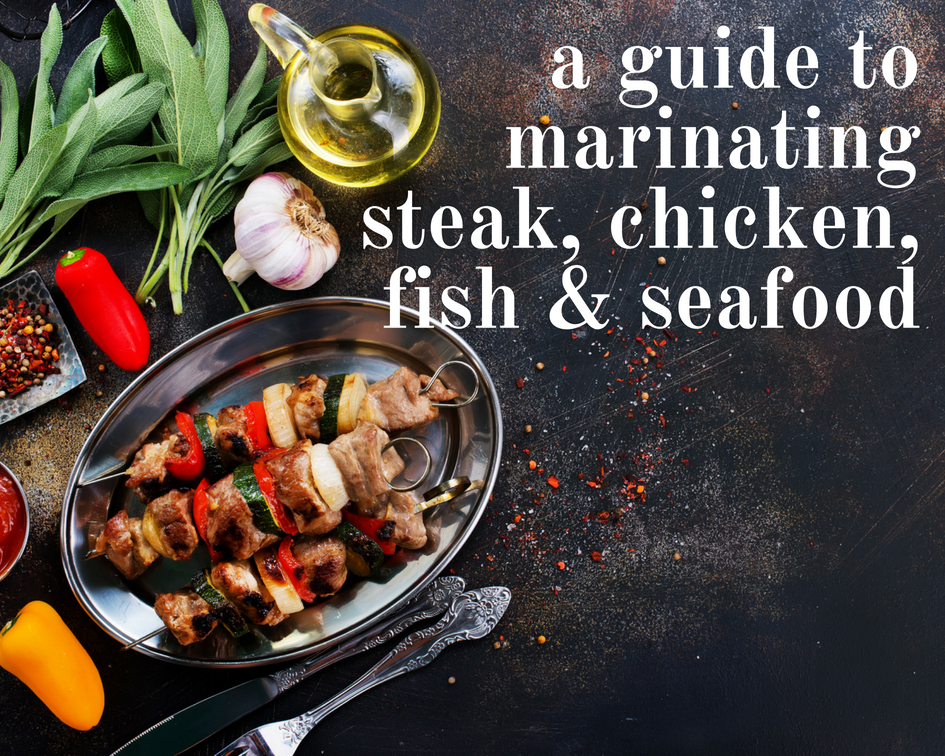Some people think marinating food is a waste of time and can be skipped. In actuality, it may be one of the most important steps to cooking. Marinating breaks down the fibrous parts of the protein and tenderizes the protein. It also allows the meat, fish, and seafood to absorb the marinade flavors. Marinating can turn a tough meat (like flank steak) into a melt-in-your-mouth meal.
How to Make a Marinade
The best thing about marinades is no recipe is needed. All that’s required is oil, an acid of some sort, and seasoning.
When finished being a chemist in the kitchen, about 1/2 cup of marinade per pound of meat is needed. So, if the steak is 2 pounds the marinade uses 1/2 cup of oil, 1/4 cup of acid and seasoning (to taste).
At least half the marinade should be a neutral, high-heat oil like canola, peanut or safflower. They will not alter the flavor and have a high smoke point.
When adding an acid, make sure not to add too much. Acid helps tenderize the protein, but adding too much will start to cook it and make it tough. Vinegar, like balsamic or apple cider, works well. Depending on the protein, wine, beer, and even buttermilk are great too. Have lemons or limes around? Cut those in half and squeeze out their juices to add a punch of citrus.
Amp up the flavor with seasoning. Dijon mustard or chili paste is delicious. Or, use fresh herbs, chopped garlic, minced shallots, and other spices too.
Some salt will help tenderize the meat, but make sure not to add too much or it will draw the moisture out of the meat. A great way to add salt is by using Worcestershire sauce, coconut aminos, tamari, or soy sauce.
A sprinkling of brown sugar, a bit of honey or a few teaspoons of maple syrup will add a bit of sweetness to the marinade. Sweetness balances out the salt from the seasoning.
Customize the marinade flavors based on what you’re cooking and what’s available in the kitchen. Before adding the marinade to the meat, taste it. Adjust seasoning as needed.
Tips for Marinating
- Pierce chicken and steak with a fork. This will help the marinade permeate the meat.
- Create the marinade in a resealable bag for easy cleanup. Add the protein and remove all air from the bag.
- To prevent spills, place the bag in a large bowl.
- A bowl, covered with plastic wrap, can be used too. However, make sure to not place the marinade in an aluminum bowl. The reaction from the aluminum could cause the food to spoil.
- Never marinade the meat on the counter. Always place the marinating protein in the refrigerator to ensure it does not spoil.
- Turn the protein a few times while marinating to make sure the marinade covers every surface.
- Once the protein has touched the marinade, do not taste again because it may contain harmful bacteria.
- If using the marinade as a sauce is a must, pour the extra marinade into a saucepan. Bring to a boil and cook for 10 minutes. Watch for burning, though, and additional liquid may need to be added as it cooks down.
- Dry the protein before grilling or baking. Gently patting with a paper towel will remove any residual bits (like minced garlic) that quickly burn.
- Remove the meat from the refrigerator an hour before preparing. Bringing the protein to room temperature will ensure it cooks evenly.
How Long to Marinate
Marinating proteins for as little as 30 minutes will break down the membranes and infuse enough flavor. For fish steaks, fillets and shrimp, 15 minutes is enough marinating time. Here’s a great chart with time suggestions for marinating chicken, fish, pork, steak and other proteins.
